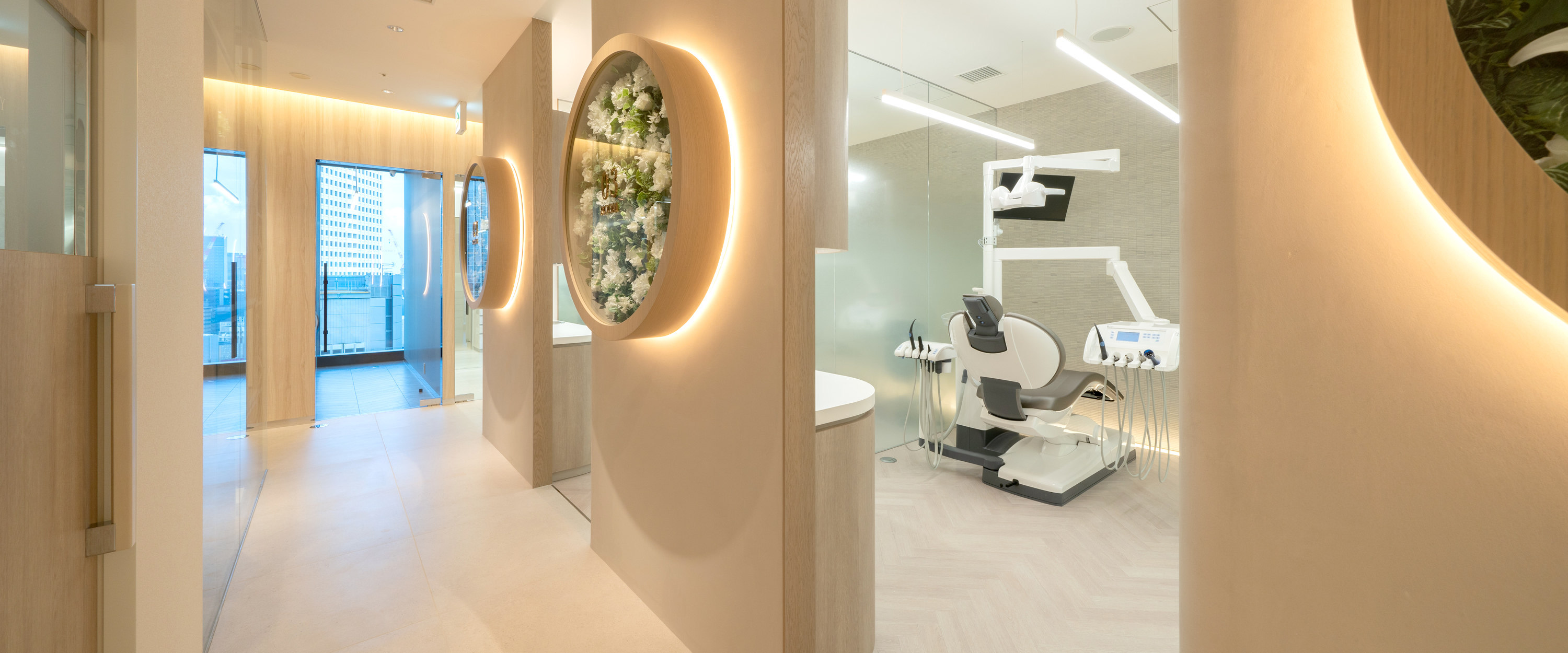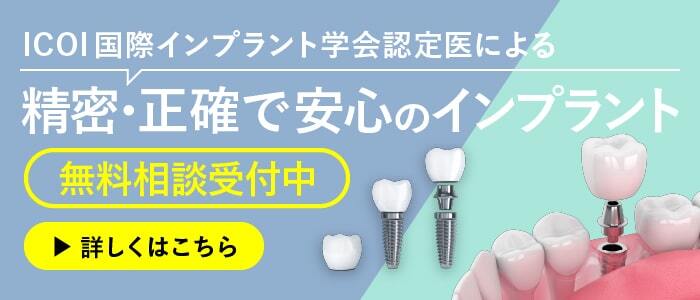Implant
What is implant treatment?

Feature 1.
Latest in Guided Surgery
Our clinic uses the latest guided surgery for all implant treatments. Guided surgery is an implant system in which the appropriate implant position is determined using simulation software on 3D bone model data taken with digital CT scans, and a surgical guide is created with a 3D printer to insert the implant exactly in that position. This eliminates any misalignment caused by the person inserting the implant freehand, allowing for accurate and safe implant treatment. Because the bone condition can be understood in advance, surgery can be performed in a short time with minimal invasiveness, and postoperative swelling and pain can be reduced.
Feature 2.
Reliable medical
compensation system
One of the features of implant treatment is that it lasts longer than treatment with bridges or dentures. It is said that the survival rate of implants is about 94% for 10 years and about 85% for 20 years after implant treatment. In order to give patients peace of mind when undergoing implant treatment, our clinic provides tiered compensation for 10 years for the implant body (fixture) embedded in the bone, and 5 years for the base (abutment) and artificial tooth (zirconia crown) attached on the implant. If any trouble occurs during the compensation period, our clinic will cover the treatment costs and you can receive retreatment. After implant treatment, continuous maintenance is required, so if you have any questions, please ask your dental hygienist.
Feature 3.
Supports a variety of implant treatments
Our clinic can handle all types of implant treatment, from single implant treatment to full-arch implant treatment where no teeth remain. Before treatment, we will conduct an examination and counseling to thoroughly discuss the treatment method, duration, treatment flow, and treatment costs before starting treatment. Single implant treatment, implant bridge, implant overdenture, all-on-four, etc.
Why is implant treatment so expensive?

Why does it cost so much?
There are some cases where implant treatment is approved as covered by insurance, but this is limited to cases where a large area of the jawbone has been lost due to illness or accident, or where more than one-third of the jawbone is missing or underdeveloped from birth. In general, implant treatment is not covered by insurance, so the treatment costs are high. The average treatment cost is approximately 300,000 to 500,000 yen per tooth. However, it is possible to reduce the burden of treatment costs by receiving a medical expense deduction, so we hope you will take advantage of this.
Implant treatment procedure
-
Tooth extraction

-
Examination
(CT, intraoral scan)
-
counseling

-
Surgical guide fabrication

-
Implant surgery

-
Stencil printing (on cloth)

-
Attachment of artificial teeth

-
Maintenance

Advantages and disadvantages of implant treatment

Advantages of
Implant Treatment
Can be chewed firmly!
The first characteristic of implants is that the bone supports the biting force in the same way as natural teeth, allowing for a firm bite. Compared to the biting force of natural teeth, it is said to be about 30% for dentures and about 60% for bridges, whereas it is said to be 90% for implants.
No grinding of
surrounding teeth!
In the case of bridges, the enamel of the adjacent teeth is almost always lost, mainly because the teeth on both sides of the missing tooth are shaved down to fit the bridge. In some cases, the tooth nerve may have to be removed. As a treatment to restore a lost tooth, it is not a good idea to cause this much damage to the adjacent teeth, as it can significantly shorten the life of the adjacent teeth. With implant treatment, there is absolutely no damage to the surrounding teeth, so there is no need to sacrifice anything for the treatment.
Long-lasting!
Implant therapy is a very long-lasting treatment. Worldwide research data shows that the implant survival rate after 10 years is 94% and even after 20 years it is 85%. Implant treatment is an expensive procedure, but in terms of its benefits and cost-effectiveness, it is the best method.
I don’t feel any different!
Since implants do not need to be removed and have almost the same shape as natural teeth, you can go about your daily life without worrying at all that you have implants.
Good looking!
The tooth portion of the implant is made of zirconia, a strong and beautiful looking ceramic. Since the teeth are indistinguishable from natural teeth, you can smile with your mouth wide open in public without worrying about your appearance.
Disadvantages of Implant Treatment
Requires surgical procedure.
Implant treatment requires surgery to place the implants into the bone. The surgery itself is a simple procedure that takes about 30 minutes to one hour and is performed under local anesthesia. However, patients with blood disorders or immune problems may not be able to undergo the surgery. If you are in the hospital for other diseases, please consult your doctor in advance.
High treatment costs.
Implant treatment is not covered by insurance and is therefore expensive. Bridges and dentures are covered by insurance, so treatment costs can be reduced, but the risk of losing another tooth is high because of the damage done to the surrounding teeth. By performing implant treatment early on, before many teeth are lost, future treatment costs can be minimized.
Long treatment period.
Implants take longer than other treatments because after being placed in the bone, the implant and bone must wait another period of time for bonding. For upper tooth implants, the waiting period for bonding is about 6 months, and for lower tooth implants, about 3 months. After that, it takes about 2 months for the second surgery and molding to fabricate the teeth, so the treatment time is generally about 8 months for upper tooth implants and 5 months for lower tooth implants.
About cases in which implant treatment is difficult

Cases in which implants are difficult to use
Implant therapy is a treatment in which the bone supports the implant to provide chewing strength, so if there is not enough bone, it is not possible to place an implant. However, there are currently treatments available to increase the amount of bone, and bone augmentation using artificial bone can be used to achieve this.
In addition, patients with poorly controlled diabetes or immunodeficiency basically cannot undergo surgical procedures due to the high risk of postoperative infection. Patients who have had a myocardial infarction, stroke, or apoplexy within 6 months of the procedure cannot undergo implant treatment. Patients with blood diseases such as leukemia or hemophilia are also contraindicated for procedures that involve bleeding, so implant treatment cannot be performed.
In the case of patients who are taking medications for osteoporosis or blood thinners for high blood pressure, etc., we will determine whether treatment is possible after discussing the medication with your internal medicine doctor.
Other cases where lifestyle factors make implants more difficult
Patients with severe periodontal disease have a higher risk of developing peri-implantitis after surgery, so it is necessary to treat periodontal disease well before implant treatment. In addition, postoperative maintenance is very important for all patients, so please visit our office regularly for maintenance.
Smokers may experience poor blood flow, which can impair wound healing and negatively affect the bond between the implant and the bone. Pre- and postoperative smoking cessation is required.
The cost of treatment for implants
The cost of implant treatment is all-inclusive, from the implant surgery to the placement of the final artificial teeth. If bone augmentation is necessary, an additional fee will be required.
| molar | 462,000 yen (tax included) |
|---|---|
| anterior pituitary | 517,000 yen (tax included) |

















